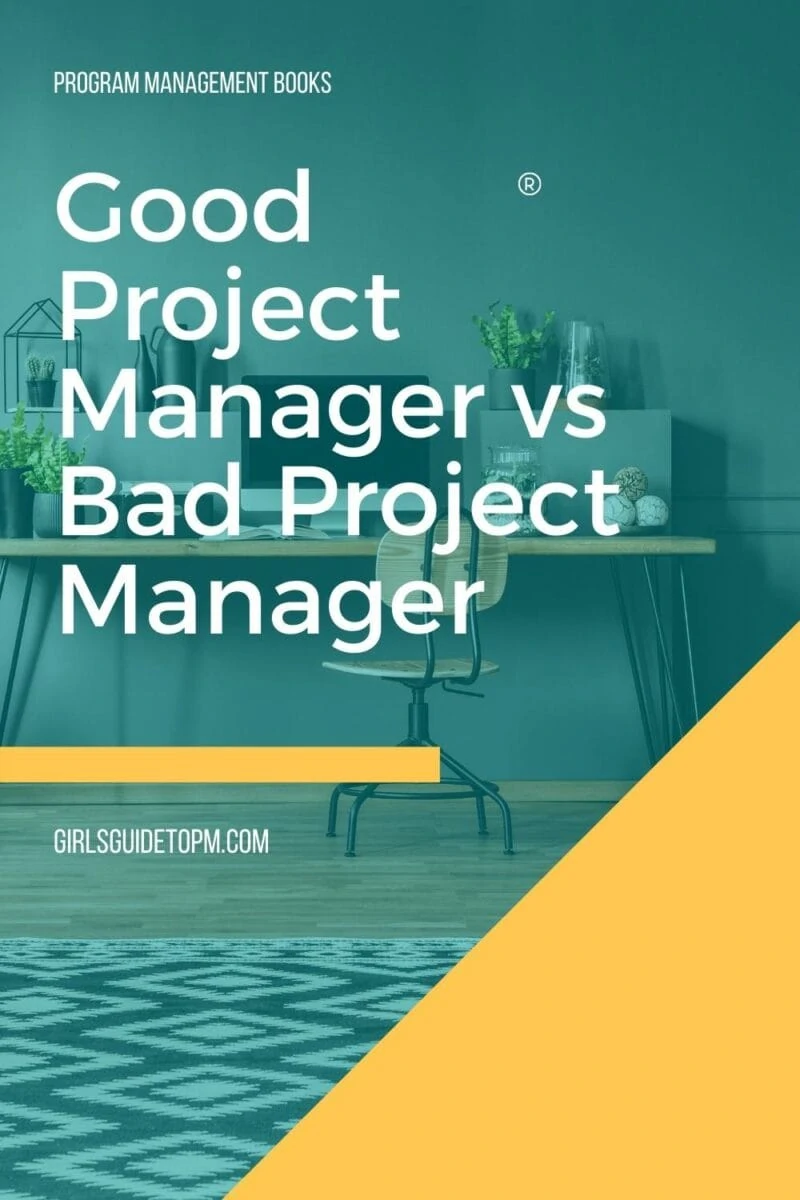Good Project Manager vs Bad Project Manager
This blog is reader-supported. When you purchase something through an affiliate link on this site, I may earn some coffee money. Thanks! Learn more.
What makes a bad project manager? And how can you be a good project manager? In this extract from their new book, Jahn Karsybaev and Fred Obiero share the characteristics and behaviors of successful and unsuccessful project leaders.
—
Leadership

A Bad Project Manager offloads the overall responsibility on others, claiming that they are just there to “oversee” things. They complain that there are never enough funds, timelines are too condensed without enough resources.
A Bad Project Manager is a bystander, not a leader. They do not have a clear understanding of various roles on the project.
Good Project Managers understand and know the market and industry of their project. They perform competitor analysis and evaluate alternatives. A Good Project Manager stays up to date on the latest trends in the industry.
Planning

A Good Project Manager takes ownership of devising an executive plan that delivers results, not excuses. A Good Project Manager is extremely organized and can clearly prioritize any task, any requirement, any issue.
A Bad Project Manager has a library of excuses to use for various situations. They are unable to clearly articulate the overall plan and rely significantly on others to complete their part.
A Bad Project Manager does not understand domain areas, and they do not take the initiative to build up their knowledge base. They constantly make excuses when issues arise on their projects.
Meetings
A Good Project Manager is extremely efficient – whether with their time or resources. A Good Project Managers runs such exceptional meetings that people actually look forward to them because they produce results.
Examples of a Good Meeting:
- Clearly defined agenda upfront with specific objectives to be accomplished during that meeting
- Relevant resources and Subject Matter Experts that are required in that meeting in order to accomplish these goals (“If I am invited to this meeting, I am in fact needed and don’t have to question why I am included”)
- Clear meeting roles: someone to capture notes, someone to share the screen or set up technical tools upfront, etc.
- Time limits and well-executed facilitation. Each participant gets an opportunity to provide their opinion
- Well-structured meeting recap with clear discussion points and action items. Action items should specify the owner of that item, with a description and the deadline
A Bad Project Manager does not have a sense of structure and time. They run meetings inefficiently, which results in participant frustration and complaints to VPs of PMO. A Bad Project Manager does not understand the importance of earning a reputation as someone who runs effective meetings, who holds people accountable, and who delivers results.
A Bad Project Manager cannot manage multiple priorities and gets easily overwhelmed.
Teamwork
A Good Project Manager does not demand dates from their resources. Instead, he or she provides recommendations and options as well as highlights potential risks to consider in order to estimate a given task.
Documentation
A Good Project Manager produces artifacts – they have all the documentation readily available and organized in one place. Every team member of that project has a clear understanding where to go and how to find any type of document.
Bad Project Managers scramble at the last minute to produce any type of documentation as they do not see it coming in the first place.
A Bad Project Manager puts out fires all day long instead of focusing on leading a project. They simply voice their opinions and don’t take action when it comes to documenting decisions.
Proactivity
A Good Project Manager proactively anticipates a particular issue, a question, or a risk. They can foresee when a particular report will be asked by an executive and they try to prepare for that in advance.
A Good Project Manager is consistent, whether with their timely delivery of the weekly status report or scheduling a prep session for the Executive Steering Committee. They do not wait for someone to request it.
A Good Project Manager is great at sales and negotiation. They understand the semantics of creating a win-win situation whether when securing a budget or a resource for a project.
Communication
A Good Project Manager can secure “buy in” from key stakeholders in advance of when the decision needs to be made.
A Good Project Manager tells a compelling story and even delivers bad news in an effective manner by offering solutions and preventative measures.
A Bad Project Manager creates conflict when negotiating for resources or funds for a project. They escalate issues prematurely because they are incapable of arriving at a mutually inclusive solution.
A Bad Project Manager is all over the place. They fit the stigma of “glorified secretary or an admin” because they only ask simple questions like, “When are you going to be done with that task?”
So which one are you? This is an edited excerpt from the book: The PM Imperative: Guide for Leading and Managing Projects, People and Delivering Value by Jahn Karsybaev and Fred Obiero
Pin for later reading


